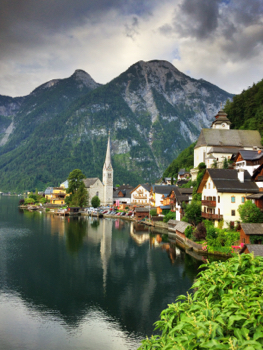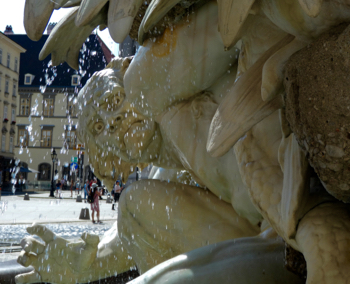Travel Experiences 9: Working the Wound, Part 3
Spacious Vienna had been a visceral relief after unrelenting crowds in Prague and Cesky Krumlov. Now I was in Hallstatt, a tiny, lovely lake town in Austria. Don’t let my early morning photo make you think it was tranquil: It must have been highlighted and underlined in Asian tour agencies. After breakfast the streets  became a churning stew of humanity. Travelers I met on busses and trains said, “Japan must be empty right now.”
became a churning stew of humanity. Travelers I met on busses and trains said, “Japan must be empty right now.”
Limping with recent stitches, I tried to take the hordes in stride, resulting in several failures—and consequent insights.
I had been deepening the practices I described in Post #7, inhaling “Ya Raqib” (invoking loving attention) and exhaling “Ya Hafiz” (invoking respect and protection).
Taking a practice on the breath is one of the simplest and hardest things. You breathe in, focusing on bringing in the quality, and breath out the same or a complimentary quality. You are training yourself to vibrate with the qualities’ unique and complex subtle natures, which you begin to discover through direct experience. This is simple if you remain natural, allow, and observe. It can be hard to remember to do it, and keep focus without becoming mechanical.
Breath practice helps keep one from picking up energy from other people.
Practice-enhancing tips:
—Aim to sense the energy of the particular qualities and feel how they impact you emotionally.
—Remain open to insight.
—Practice and experience are more important than theory.
—Understanding develops organically, following experience.
Spiritual practice can sensitize us to the issues it addresses. This enhanced awareness is advantageous. It is not, however, always comfortable. If a particular practice is correct for an individual, doing it intensively helps to resolve underlying issues. Before they are resolved, the practice may well sensitize us to and activate those same issues. During that phase practice can feel counterintuitive. It takes attention and compassion to excavate and exhaust the accumulated impressions that give rise to defensive reactions.
Immersed again in throngs, my leg wound was making me self-protective. I did not want to be forced to step on something uneven and pull my stitches, and I couldn’t see the ground around all the bodies! Feeling unsafe released adrenaline, amplifying the survival reactions that arose from feeling trapped and overwhelmed by feeling the energy of so many people at close range. When I could stay with my breath I did okay. When I forgot, I felt as if the engulfing crowds might swallow and obliterate me. I had to exercise constant restraint not to rush to break free. The language barrier exacerbated feeling trapped and even helpless since I couldn’t communicate and people were pointedly resisting eye contact. Eventually I reacted.
I was trying to penetrate a tour group completely blocking the street. People were facing me, just standing there waiting for something. I said “excuse me,” but they looked through me as if I didn’t exist. I said it louder, from a few inches away. Absolutely no response. I finally windmilled my hands in front of a few blank faces, shouting “HEY!”
Okay, it was naughty, but the result was also rather humorous: The tourists in front of me started and blinked exactly as if I had literally just materialized from another dimension! I felt as if I had suddenly taken form on the material plane. Getting a response was a relief.
I started to enter the sand trap of shame, then shifted to sincere remorse, from which it was easier to  rebalance and return to my practices. Breathing through my feet worked better, but contemplating the specific nature of each individual in front of me also helped me manage large groups in confined spaces. With practice and sufficient attention, I can use dignity and presence to supply myself with connection and safety instead of reacting.
rebalance and return to my practices. Breathing through my feet worked better, but contemplating the specific nature of each individual in front of me also helped me manage large groups in confined spaces. With practice and sufficient attention, I can use dignity and presence to supply myself with connection and safety instead of reacting.
A colleague at home later described being in a Seattle coop after having wounded her knee. She said she reacted similarly in the busy store. This made me feel better since she has a pleasant and patient nature.
What kind of situation or conditions demand self development for you?
What makes them challenging?
What qualities or behaviors would it serve you to develop?


